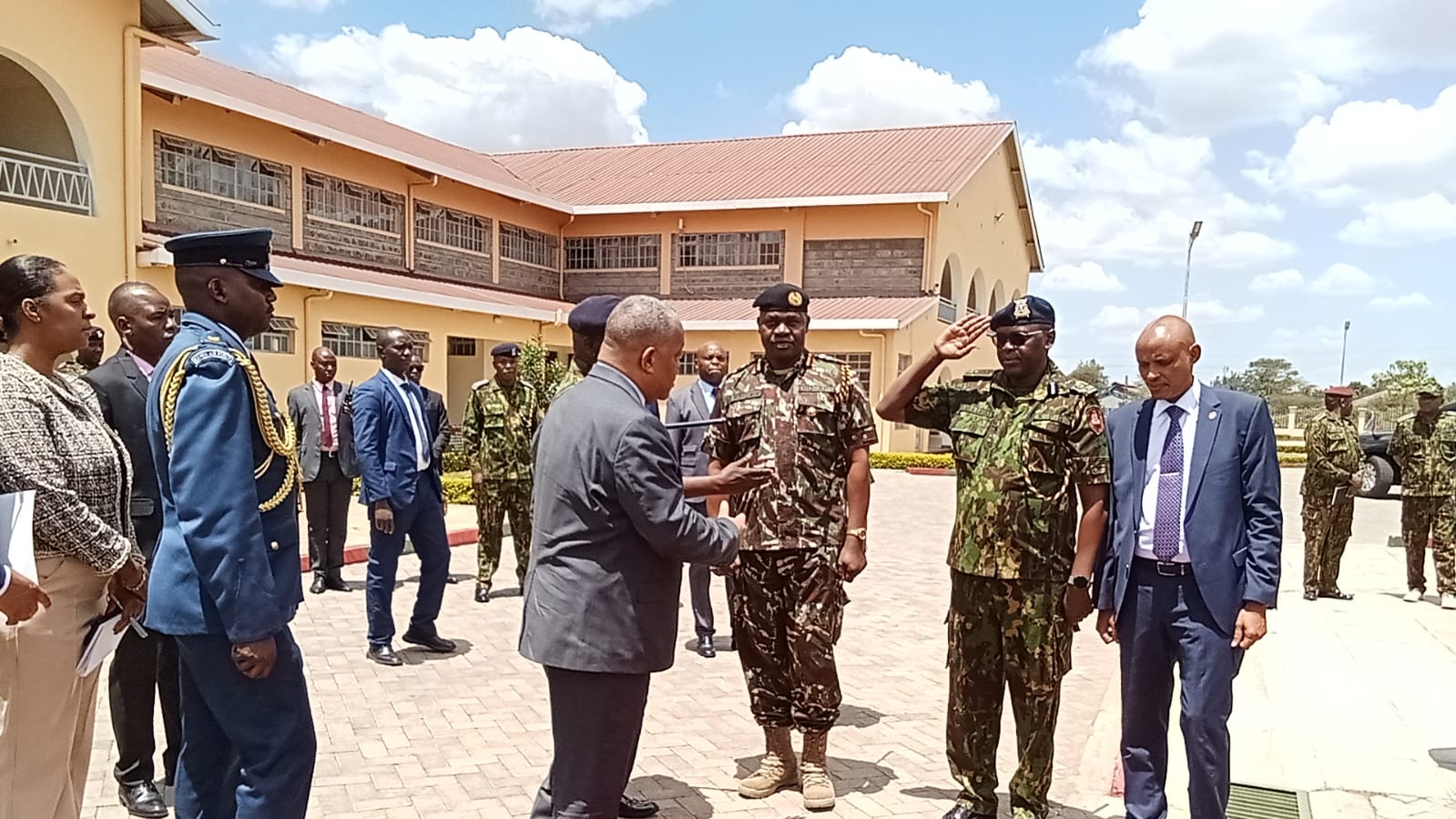Haitian PM visits Nairobi police college to asses pre-deployment training for Haiti mission

Kanja announced that up to 600 police officers are currently undergoing training and will be deployed to lawless-hit Haiti next month.
The Prime Minister of Haiti, Gary Conille, on Saturday visited the Administration Police Training College in Embakasi, Nairobi.
The Prime Minister, who has been in the country on an official visit, was hosted by Inspector General of Police Douglas Kanja, head of the Directorate of Criminal Investigations Mohamed Amin, and other senior police officers.
More To Read
- Police officers returning from Haiti to be honoured at Jamhuri Day parade
- 230 Kenyan police officers arrive in Port-au-Prince to reinforce UN-backed GSF
- Kenyan police officers in Haiti to return home after year-long deployment
- Record cocaine seizure in Haitian waters underlines country’s ‘pivotal’ trafficking role
- Haiti security forces say era of unchecked gang power is over as crackdown intensifies
- Haiti, Panama and Curaçao seal historic World Cup spots
Conille, while addressing the media, said he visited the police training college to observe and learn where Kenyan security officers, now deployed to his country, are being trained.
“I am happy to be here to observe and learn how Kenyan security officers are trained to combat insecurity,” said Conille.
He thanked the Kenyan police officers for taking up the challenge of travelling thousands of miles to his country to help maintain peace and order.
“I am grateful to the President of Kenya for agreeing to assist Haiti in its time of need,” said Conille.
Kanja announced that up to 600 police officers are currently undergoing training and will be deployed to lawless-hit Haiti next month.
“Indeed, we have 600 police officers in training, and they will be deployed to Haiti next month,” said Kanja.
During the visit, the Haitian leader held a closed-door meeting with Kenya's security chiefs. The visit to the police training college comes a day after Kenya appealed for urgent financial support from the international community to sustain its deployment in Haiti, which has been extended by a year.
The multinational security mission, which began in June this year, is assisting in the fight against gangs controlling much of the capital, Port-au-Prince, and nearby areas.
 Prime Minister of Haiti Gary Conille at the Administration Police Training College in Embakasi, Nairobi. He was hosted by the Inspector General of Police Douglas Kanja among other security bosses on Saturday morning. (Photo: Barack Oduor)
Prime Minister of Haiti Gary Conille at the Administration Police Training College in Embakasi, Nairobi. He was hosted by the Inspector General of Police Douglas Kanja among other security bosses on Saturday morning. (Photo: Barack Oduor)
More than 3,600 people have been killed in the country since January, including over 100 children, while more than 500,000 Haitians have been forced from their homes, according to the UN.
“We are asking the international community to match their commitment and pledges with the necessary action for us to be able to complete the task ahead of us,” President William Ruto said on Friday.
Kenya deployed 400 of its pledged 1,000 police officers in June and July this year. On Friday, President Ruto said the remaining 600 are undergoing training and would join the mission next month.
A handful of other countries have together pledged at least 1,900 more officers.
Although the mission was approved by the UN Security Council, it is not a UN operation and relies on voluntary financial contributions.
It is unclear how much money has been spent so far, but Ruto says more financial support is needed to “sustain” the mission until October next year.
“When resources are made available, there will be demonstrable progress of the mission,” President Ruto said, adding that the available funds would run out by March next year.
“We have a window of success that is evident from the operations carried out already,” the President added.
He also noted that the deployment was already showing positive results, “restoring hope and a glimpse of stability”. Conille urged international partners to fulfil their pledges to ensure the Kenyan contingent has the necessary resources.
The Haitian Prime Minister dismissed reports that the Kenyan police officers were staying in camps like tourists while gangs tightened their grip on large parts of Port-au-Prince since the mission began.
“I have personally been on patrol with the Kenyan troops, who have engaged in delicate operations in the city centre. They are involved in patrolling universities, hospitals, and administrative areas,” Conille said.
“They are also up north to help address the gang threat.”
Last month, the UN Security Council unanimously adopted a resolution to extend the mandate of the mission for another year and rejected Haiti's calls to transform it into a UN peacekeeping mission.
A UN human rights expert who recently visited the Caribbean nation said the mission was inadequately equipped and needed helicopters, as well as night vision goggles and drones.
“The Multinational Security Support Mission (MSS), authorised by the UN Security Council in October 2023, has so far deployed less than a quarter of its planned contingent,” William O’Neil said last month.
Top Stories Today














































